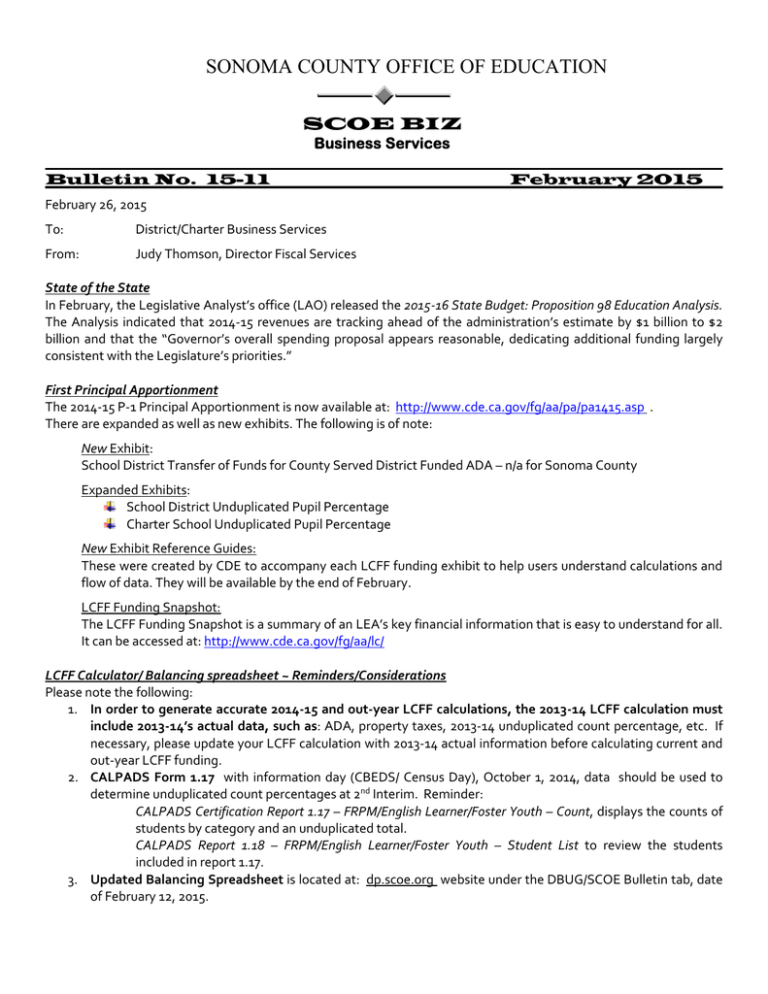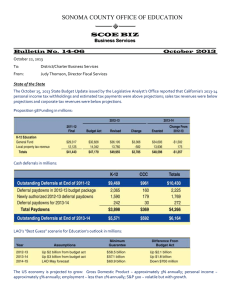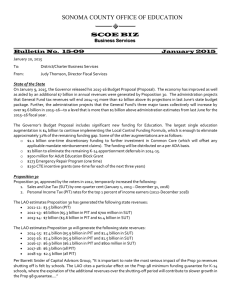SONOMA COUNTY OFFICE OF EDUCATION SCOE BIZ
advertisement

SONOMA COUNTY OFFICE OF EDUCATION SCOE BIZ Business Services Bulletin No. 15-11 February 2015 February 26, 2015 To: District/Charter Business Services From: Judy Thomson, Director Fiscal Services State of the State In February, the Legislative Analyst’s office (LAO) released the 2015-16 State Budget: Proposition 98 Education Analysis. The Analysis indicated that 2014-15 revenues are tracking ahead of the administration’s estimate by $1 billion to $2 billion and that the “Governor’s overall spending proposal appears reasonable, dedicating additional funding largely consistent with the Legislature’s priorities.” First Principal Apportionment The 2014-15 P-1 Principal Apportionment is now available at: http://www.cde.ca.gov/fg/aa/pa/pa1415.asp . There are expanded as well as new exhibits. The following is of note: New Exhibit: School District Transfer of Funds for County Served District Funded ADA – n/a for Sonoma County Expanded Exhibits: School District Unduplicated Pupil Percentage Charter School Unduplicated Pupil Percentage New Exhibit Reference Guides: These were created by CDE to accompany each LCFF funding exhibit to help users understand calculations and flow of data. They will be available by the end of February. LCFF Funding Snapshot: The LCFF Funding Snapshot is a summary of an LEA’s key financial information that is easy to understand for all. It can be accessed at: http://www.cde.ca.gov/fg/aa/lc/ LCFF Calculator/ Balancing spreadsheet ~ Reminders/Considerations Please note the following: 1. In order to generate accurate 2014-15 and out-year LCFF calculations, the 2013-14 LCFF calculation must include 2013-14’s actual data, such as: ADA, property taxes, 2013-14 unduplicated count percentage, etc. If necessary, please update your LCFF calculation with 2013-14 actual information before calculating current and out-year LCFF funding. 2. CALPADS Form 1.17 with information day (CBEDS/ Census Day), October 1, 2014, data should be used to determine unduplicated count percentages at 2nd Interim. Reminder: CALPADS Certification Report 1.17 – FRPM/English Learner/Foster Youth – Count, displays the counts of students by category and an unduplicated total. CALPADS Report 1.18 – FRPM/English Learner/Foster Youth – Student List to review the students included in report 1.17. 3. Updated Balancing Spreadsheet is located at: dp.scoe.org website under the DBUG/SCOE Bulletin tab, date of February 12, 2015. 4. Minimum Proportionality Percentage (MPP) calculation: Have you prepared an MPP calculation? Feel free to let us review before giving it to your ESS/Instruction LCAP staff. Have you given the latest MPP calculation to your ESS/Instruction staff who will be preparing the LCAP? When are you meeting with your ESS/Instruction staff who will be/are preparing the LCAP? Have you created a separate management code, unrestricted resource code, or goal to identify supplemental and concentration grant expenditures? If yes, please identify and inform your accountant as well as your ESS/Instruction LCAP team. SB 854 – New Labor Compliance Procedures SB 854 was signed into law on June 20, 2014. SB 854 made several changes to the laws governing how the Department of Industrial Relations (DIR) monitors compliance with prevailing wage requirements on public works projects. Per the DIR, “Public works refers to construction, alteration, demolition, installation, or repair work (including maintenance) done under contract and paid by public funds. Public works projects do not include those done by a public agency with its own employees.” With minor exceptions, all workers employed on public works projects must be paid the prevailing wage determined by the Director of the Department of Industrial Relations according to the type of work and location. The prevailing wage rates are usually based on rates specified in collective bargaining agreements. Section 1771 under the Labor Code states, “Except for public works projects of one thousand dollars ($1,000) or less, not less than the general prevailing rate of per diem wages for work of a similar character in the locality in which the public work is performed…. This section is applicable to contracts let for maintenance work.” Some key SB 854 regulations follow: o Elimination of the obligation to pay DIR for compliance monitoring on state bond-funded projects and other projects that required use of DIR's Compliance Monitoring Unit (CMU). o As of January 1, 2015, the call for bids and contract documents must include certain info. o All contractors and subcontractors who bid or work on a public works project must register and pay an annual fee of $300 to DIR and thereafter provide their DIR registration number to the public agency requesting quotes, bids, or contract proposals submitted for maintenance and construction projects. There is a phase in timetable. However, by April 1, 2015 no contractor or subcontractor may work on a public works project unless registered with DIR. o Once the registration requirement becomes mandatory (March 1, 2015 for bids and April 1, 2015 for work), public agencies must verify contractors/subcontractors are registered with the DIR at the time proposals are accepted and before signing contracts or issuing POs. o Public agencies are to provide notice electronically to DIR within 5 days of the date of the contract award or PO issuance of a public works project, using the online PWC-100 form. o All contractors and subcontractors must furnish electronic certified payroll records directly to the Labor Commissioner (aka Division of Labor Standards Enforcement). There is phase-in timetable. However, by January 1, 2016, the requirement to furnish electronic certified payroll records to the Labor Commissioner will apply to all public works projects, whether new or ongoing. Exceptions: The Labor Commissioner may (but is not required to) excuse contractors and subcontractors from furnishing electronic certified payroll records to the Labor Commissioner on a project that is under the jurisdiction of one of the four legacy DIR-approved labor compliance programs (Caltrans, City of Los Angeles, Los Angeles Unified School District, and County of Sacramento) or that is covered by a qualifying project labor agreement. o These new requirements will apply to all public works that are subject to the prevailing wage requirements of the Labor Code, without regard to funding source. o Requirements for projects prior to the adoption of SB 854 differ depending on whether the contract was awarded prior to January 1, 2012 or on or after January 1, 2012. For greater detail, please see attached or go to: http://www.dir.ca.gov/Public-Works/SB854.html INTEREST EARNED ON FEDERAL FUNDS For fiscal year 2014–15, please note the following updates to the CDE federal interest guidelines: 1. Calculate and remit interest at least on a quarterly basis. If there is no interest to remit, submit an e-mail or letter to the CDE’s Cash Management Analyst stating no interest is due and specify the reporting period. 2. When remitting interest payments, include the County-District-School code and specify the time period(s) for which interest was earned (e.g. July1, 2014 through September 30, 2014). If remittance comprises of multiple time periods, separately report the interest for each time period. 3. If federal cash balances cannot be separated from commingled state and federal funded programs, interest should be calculated on the entire combined cash balance. However, if state funds can be separated from federal program funds, interest should be calculated only on the federal program funds. 4. If on a reimbursement basis, LEAs should omit Special Education and School Nutrition programs from interest calculations. 5. LEAs will be entitled to keep up to $500 per fiscal year on federal interest earned after January 1, 2015. This means that for Q1 (7/1/2014-9/30/2014) and Q2 (10/1/2014-12/31/2014), federal interest earned falls under the old cap and cannot be greater than $100. However, during Q3 (1/1/2015-3/31/2015) and Q4 (4/1/2015-6/30/2015) federal interest earned can aggregate up to $400 for those two periods before being remitted. Thus, it is possible to keep $500 of federal interest in the fiscal year ended 6/30/2015. NOTE: LEAs should remit to the CDE only the interest earned on federal program advances administered by the CDE (interest earned on non-CDE administered program advances should be calculated separately and remitted to the Federal Treasury via the appropriate state or federal agency). In addition, LEAs should only calculate interest on the cash balances of federal program advances (cash balances of federal reimbursement programs should be omitted in calculating federal interest due to the Federal Treasury). For greater detail, go to: http://www.cde.ca.gov/fg/ac/co/intfedfunds-calculating.asp Federal Cash Management Data Collection ~ Reporting in Fiscal Year 2014-2015* Reporting Period Reporting Start Date Reporting Deadline 3 01/10/2015 01/31/2015 4 04/10/2015 04/30/2015 *Cash balance to be reported regardless of the fiscal year from which it originated. Dates to Remember: 03/06/2015 03/12/2015 03/15/2015 03/20/2015 03/26/2015 03/26/2015 03/27/2015 04/01/2015 Hands on Position Control Budget Development Workshop Budget Development Workshop Second Interim Reports due to SCOE Open Lab Charter/ District Meeting DBUG Hands on Budget Development Workshop Auditor selection due to SCOE NOTE: Documents that are presented at DBUG may be found at dp.scoe.org website under the "DBUG/SCOE Bulletins" tab.

